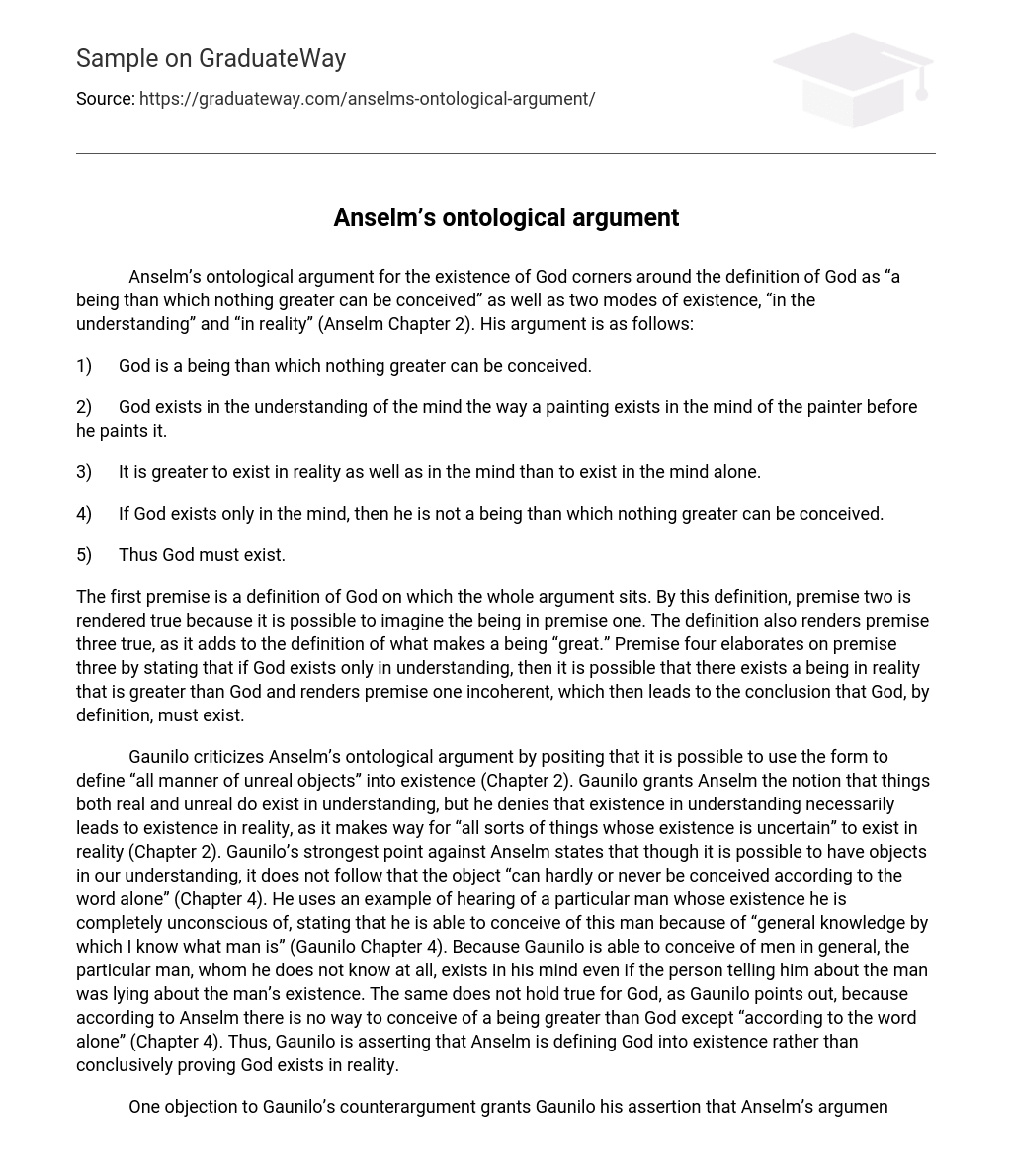Anselm’s ontological argument for the existence of God corners around the definition of God as “a being than which nothing greater can be conceived” as well as two modes of existence, “in the understanding” and “in reality” (Anselm Chapter 2). His argument is as follows:
1) God is a being than which nothing greater can be conceived.
2) God exists in the understanding of the mind the way a painting exists in the mind of the painter before he paints it.
3) It is greater to exist in reality as well as in the mind than to exist in the mind alone.
4) If God exists only in the mind, then he is not a being than which nothing greater can be conceived.
5) Thus God must exist.
The first premise is a definition of God on which the whole argument sits. By this definition, premise two is rendered true because it is possible to imagine the being in premise one. The definition also renders premise three true, as it adds to the definition of what makes a being “great.” Premise four elaborates on premise three by stating that if God exists only in understanding, then it is possible that there exists a being in reality that is greater than God and renders premise one incoherent, which then leads to the conclusion that God, by definition, must exist.
Gaunilo criticizes Anselm’s ontological argument by positing that it is possible to use the form to define “all manner of unreal objects” into existence (Chapter 2). Gaunilo grants Anselm the notion that things both real and unreal do exist in understanding, but he denies that existence in understanding necessarily leads to existence in reality, as it makes way for “all sorts of things whose existence is uncertain” to exist in reality (Chapter 2). Gaunilo’s strongest point against Anselm states that though it is possible to have objects in our understanding, it does not follow that the object “can hardly or never be conceived according to the word alone” (Chapter 4). He uses an example of hearing of a particular man whose existence he is completely unconscious of, stating that he is able to conceive of this man because of “general knowledge by which I know what man is” (Gaunilo Chapter 4). Because Gaunilo is able to conceive of men in general, the particular man, whom he does not know at all, exists in his mind even if the person telling him about the man was lying about the man’s existence. The same does not hold true for God, as Gaunilo points out, because according to Anselm there is no way to conceive of a being greater than God except “according to the word alone” (Chapter 4). Thus, Gaunilo is asserting that Anselm is defining God into existence rather than conclusively proving God exists in reality.
One objection to Gaunilo’s counterargument grants Gaunilo his assertion that Anselm’s argument can be used to define anything into existence, except for God. Anselm is not attempting to prove the existence of unreal objects whose properties cannot be measured, only God, whose properties can be measured, such as goodness, fairness, etc., of which there is a maximum. Part of this counterargument takes into account the inherent properties of God, the greatest of all possible beings. Unreal objects or objects whose properties cannot be measured therefore do not apply to this argument form because the maximum can continue on to infinity, such as “a banana than which nothing greater can be conceived.” Because it is always possible that a greater banana exists, and because there is no basis for what is meant by “greater banana,” the form does not apply to such objects, and therefore Gaunilo’s assertion that Anselm is making possible the existence of unreal objects is false.
The argument against Gaunilo and in favor of Anselm is not persuasive because it rests on the same premises as Anselm’s argument, and both arguments are assuming that God must necessarily exist if he can be said not to exist. Anselm’s assumption on the nature and inherent properties of God make way for the possibility that evil also exists, and the same form can be used there, which makes Gaunilo’s counter more persuasive. The devil can be a being than which nothing greater can be thought, and as such must necessarily exist, but it is doubtful that Anselm would be willing to agree on that point. Therefore, the counter to Gaunilo’s argument does not persuade me because even if we grant that Anselm is speaking only of inherent properties, the same can be said of things like evil, and to accept Anselm’s argument we must also accept the idea of the complete opposite of God, the properties of which can also be measured and maximized.
Works Cited
Saint Anselm. “Proslogium.” Chapters II-IV: 1078.
Gaunilo. “On Behalf of the Fool.” Chapters II-IV: 1078.





